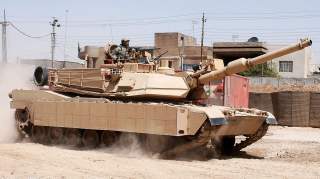Get Ready for the U.S. Army's M-1A2C Abrams Tank
It will wreck all enemies.
The new M-1A2C Abrams boasts new active and passive protection that could help to protect it from the latest enemy weaponry. The most obvious new features of the M-1A2C are the vehicle's Trophy active-protection systems and an additional slab of armor on the front of its turret.
The U.S. Army’s newest tank has made its apparent operational debut at a multi-national exercise in Romania.
(This first appeared earlier in June 2019.)
The M-1A2C, previously known at the M-1A2 System Enhancement Package Version 3, appeared in imagery that the U.S. Defense Department published to mark the May 29, 2019 commencement of Justice Eagle, a U.S.-Romanian war game at Romania’s Smardan Training Area.
The tanks appear to belong to 1st Battalion, 16th Infantry Regiment, part of the 1st Armored Brigade Combat Team, 1st Infantry Division, whose home base is Fort Riley in Kansas.
The new M-1A2C Abrams boasts new active and passive protection that could help to protect it from the latest enemy weaponry. The most obvious new features of the M-1A2C are the vehicle's Trophy active-protection systems and an additional slab of armor on the front of its turret.
Trophy uses a radar to detect incoming missiles and rockets then fires tiny projectiles to intercept the munitions. The Army also is back-fitting Trophy to some older M-1 models.
The bulky Trophy hardware is what gave away the M-1A2C’s presence in Romania.
The M-1A2C is the latest variant of Abrams to enter production. The Army in late 2017 accepted the very first M-1A2C Abrams tanks.
Congress in 2019 gave the Army $1.5 billion to buy 135 M-1s from General Dynamics, extending a program that began in the 1970s. The Army’s budget proposal for 2020 asks for 174 new and upgraded tanks.
After several years of production, the service has enough M-1A2Cs to equip an entire brigade. “We’re in the throes of getting that together,” Hank Kennedy, a manager at General Dynamics’ tank plant in Lima Ohio, told Lima News.
A U.S. armored brigade typically operates around 100 tanks. The Army has 16 armored brigades as part of a total force of 58 combat brigades.
The “first brigade is critical because we need to get [them] into the soldiers’ hands so they can get trained on it and everything else,” Kennedy said.
The first M-1 entered service with the Army in 1980. The original M-1 packed a 105-millimeter gun. The Army bought 3,300 of them. In 1984 the Army added thicker armor to a batch of new M-1s and called these 900 tanks M-1IPs. The U.S. military no longer uses these early M-1s.
A major upgrade in 1986 added a new 120-millimeter gun. This is the M-1A1. The Army and Marines bought 5,200 copies through 1992. Roughly a thousand M-1A1s still are in service with the Marines and Army National Guard. Another 3,000 or so are in storage.
There are bewildering number of subvariants of the M-1A1, each boasting incremental improvements in drive-train, armor and electronics. The latest upgrade, the M-1A1SA, has a factory-fresh engine, digital electronics and a top-secret armor blend that includes a thin layer of uranium.
The Army plans to retire all M-1A1SAs by 2025.
The M-1A2 appeared in 1992. It’s pretty much a new tank, with better armor than the basic M-1A1 plus a new internal layout and fresh sensors that together allow the gunner and the commander independently to search for targets.
The Army has acquired around 1,500 M-1A2s and converted most of them to the System Enhancement Package Version 2 standard. The M-1A2SEPv2, which General Dynamics describes as a "digital tank," features high-end computers, a remotely-operated machine gun on the turret and a dozen batteries that allow the tank quietly to operate its sensors without turning on its engine.
The M-1A2C in essence is a better-protected M-1A2SEPv2 that's also easier to upgrade. In addition to Trophy and more armor, the new tank boasts more electrical power, better diagnostic systems and a data-link that's compatible with programmable ammunition types that are in development.
"The Abrams M-1A2C can host any mature technology the Army deems operationally relevant," the Army stated. The latest version of the M-1 arguably is the best tank in the world. For now.
Russia and China both are developing new fighting vehicles. Russia's high-tech Armata tank has run into development problems. China successfully has fielded hundreds of new Type 99A tanks that roughly are similar to mid-generation, digital M-1s. But China has struggled to adapt old-style doctrine to its new armor.
Anticipating the day when Russia resumes modernizing its tank corps and China figures out how to use its own new fighting vehicles, the U.S. Army already is planning a new M-1 variant to follow the M-1A2C.
The "cornerstone technology" of the M-1A2D is a new infrared sensor, according to the Army. The newest Abrams will also sport a new laser range-finder and will be compatible with artificial intelligence that could make the tank more autonomous, the Army stated.
The plant in Lima, the only factory in the United States that builds tanks, nearly is doubling its workforce in anticipation of large orders for new tanks.
Kennedy told Lima News the tank plant’s workforce has grown from around 500 to more than 600 since a hiring spree started in late 2018. He said he expects the workforce to expand to 700 by the end of 2019 and exceed 900 in 2020.
David Axe serves as Defense Editor of the National Interest. He is the author of the graphic novels War Fix, War Is Boring and Machete Squad.
Image: Wikimedia

